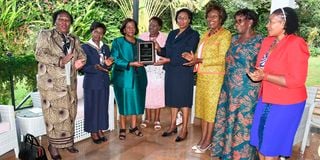Cabinet inclusion of women is good, now deal with two-thirds rule, FGM

Former Cabinet Minister Nyiva Mwendwa (in green)receives an award from Gender CS Margaret Kobia at the former’s home in Gigiri, Nairobi, on February 25. Looking on are other women leaders.
In his maiden address to the 13th Parliament last week, President William Ruto singled out the election of an unprecedented high number of women in single-member constituencies as a milestone. Indeed, the election of 29 woman Members of the National Assembly is notable and extraordinary, progress that will be consistently referenced to inspire and encourage voters to look out for gender balance during elections.
The women include at least 15 of the 93 MPs re-elected to the National Assembly while Senators Agnes Kavindu of Machakos and Fatuma Dullo (Isiolo), were among the 17 who retained their seats. The two were among the four women who entered the Senate in 2017.
Nakuru’s Susan Kihika has since been elected governor while the nominated Prof Margaret Kamar opted out of this year’s elections. Ms Tabitha Karanja Keroche was elected to replace Ms Kihika as Nakuru senator.
The nomination of eight women to the Cabinet with two others appointed at the same level as national advisers is also exceptional and remarkable. Should Parliament approve their nomination, it will be the first time the Cabinet will have such a large number of women who also hold crucial dockets.
It has been quite a journey to the top for women in Kenya—the reason the democratic gains that have seen more of them in top leadership positions need to be recognised, appreciated and nurtured.
The first time a woman joined the Cabinet was in 1995, more than three decades after Independence. On May 9, then President Daniel arap Moi appointed Kanu MP for Kitui West Nyiva Mwendwa, who had joined politics in 1974, Minister for Culture and Social Services, days to the World Conference on Women, in Beijing, China, due that September. Instructively, she led Kenya’s delegation to that high-powered international event.
International Women’s Day
Ms Mwendwa’s experiences as the sole woman minister, while not interesting, are inspiring, nonetheless. At an event to celebrate her during this year’s International Women’s Day, on March 8, the veteran politician narrated how she would be insulted and despised by her male colleagues because of her gender, attributing it to the patriarchal structure. The spotlight with negative energy was always on Ms Mwendwa and her every move—the most conspicuous being the Beijing trip, when she was roundly criticised for having her hairdresser in the delegation.
The women Cabinet nominees are, without a doubt, qualified for the positions they were appointed to and should serve with diligence, going by their record and experience. Kenya’s women have, over the years, fought their way through, among others, empowerment and mentorship in leadership spaces.
But the effort would be futile without political will and forward-looking leadership. With indications that the new Kenya Kwanza administration has that goodwill, the hope for more women as principal secretaries and CASs (should the position be retained) is high, which will be a good way of achieving the constitutional two-thirds gender rule. That also needs to be discernible in nominations to key parliamentary committee slots, to add to the creditable election of Uasin Gishu Woman Rep Gladys Shollei as Deputy Speaker of the National Assembly.
Women’s Rights
The Department of Gender and Affirmative Action and the Women’s Rights Agency adviser Harriet Chiggai have their job cut out for them, particularly in combating sexual and gender-based violence (SGBV).
The Uhuru Kenyatta administration put in place measures to fight all forms of SGBV—including domestic violence, teenage pregnancy, female genital cutting and other violations against women and girls. But the criminality appears to be digging deeper into communities and society.
A report by the Gender Violence Recovery Centre on the incidence of vice in a handful of places, released last week, is depressing. Covering just eight months, January-August, it says 2,519 cases of violations, mainly against women and girls, were reported—many, sadly, sexual attacks on children. It also cites cases of rape against women aspirants in the elections, women targeted while leaving campaign rallies and even in homes.
That the crime continues unabated calls for urgent and, probably, new strategies to battle it as statistics reveal a worrying situation.
Ms Rugene, a consulting editor, is the founder of the Woman’s Newsroom Foundation. [email protected].





